Gary Vaynerchuk's Blog, page 14
January 22, 2021
What is Clubhouse app, and why does it matter?
Let’s talk about Clubhouse app.
The app is the beginning of a wildly underrated, emerging, social media platform. Why is it underrated? Because most people don’t know about it yet. While many of you might already know about Clubhouse, in the scheme of 300 million plus Americans and 7.5 billion people on earth, very few do.
The audio resurgence that I’ve been talking about for years continues as Clubhouse becomes a very popular place for many people to have conversations around a bunch of topics. It is an app many of you should keep an eye on. I’m very fond of it; it replicates real life. What if any number of people got together at a dinner table and just talked? Then, what if everyone got to listen to it?
It makes sense why it’s working. I love the audio platform…I think, a year from today, a lot more people will be on it. I’ve been using the app for several months now, and I’m excited to share some of my thoughts and answer some of your questions.
What is Clubhouse?As I mentioned above, Clubhouse is an audio based, social media app. However, it’s notable for its big name users and for allowing these users to connect with their fans, critics, or whoever else. This is important because in a post-Covid world many casual networking events, and informal hangouts, have disappeared. So, it’s easy to see why the app has been compared to everything from Twitter to LinkedIn, and even Soho House.
In Clubhouse, users create “Rooms” where they are responsible to curate discussions around a variety of topics, from How to effectively network during Covid to Is Kevin Hart Funny? Or, they have the option to join someone else’s room. Then, users can either speak on a topic or listen to everyone else’s opinion. It’s been compared to being at a house party, conference, or just walking around outside. I thought it was a great new medium to host this morning’s Tea With GaryVee Q&A. After looking at some of your comments on Twitter, I think you guys agree.
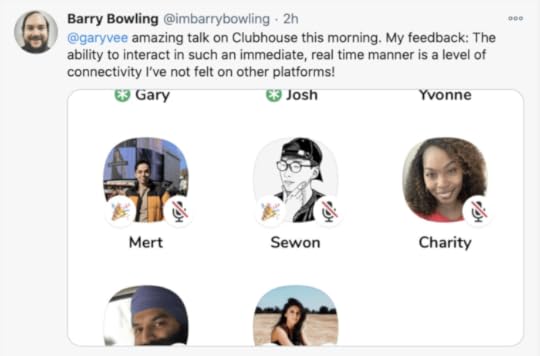


Users can follow other users who they feel curate interesting discussions or have interesting opinions. All conversations are wiped clean after the session is over, rather than being saved or archived, so if you want to hear someone’s session you have to actively participate. Finally, you have the option to receive a notification if someone you follow has curated a room.
How to get a Clubhouse invite?It’s no secret that Clubhouse is kind of exclusive, it’s invite only. The app is still in beta and while they’re working through issues and fixing bugs, a select number of people have been given invitations to test features and further explore the app. Initially, invitations were limited to notable people in the tech, entertainment, and media industry. However, each person who receives an invite also receives invitations to share with anyone they feel would find value from the experience. So, you don’t have to be an influencer, or know someone who is, to test out the space.
So, how do you get a Clubhouse invite? Look around your circle, notice who’s a member of a creative or tech-focused industry, and ask. If you have an extra invite, drop a comment below.
Is Clubhouse only for Apple?Right now, Clubhouse is only available on iOS. However, the company plans to create an Android friendly version of the app as soon as May 2021.
How does Clubhouse work?Here’s the fun part. Let’s talk about the layout. After you’ve poked around in your network and secured an invitation, you have two options. The app’s algorithm will provide you with a list of people you may be interested in following. After you choose to follow someone on the list, or not, you can sit in a room or curate your own. Again, it really is just humans discussing topics and listening to one another.
That’s it. Yes, some users may be celebrities or influencers, but ultimately, the app is another way for people to stay connected. You may end up catching the attention of a CEO or exec who likes to hear your idea–and maybe you won’t. But, regardless of the outcome, if your intent is to be authentic, provide value, and empathetically listen to others…you’re gonna have a lot of fun. Talking when you know, and not being afraid to say something AND staying quiet are the keys to clubhouse.
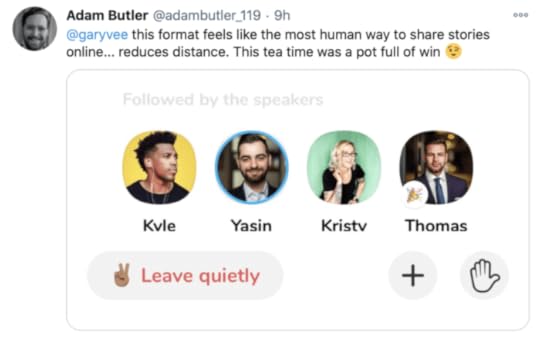
The post What is Clubhouse app, and why does it matter? appeared first on GaryVaynerchuk.com.
January 21, 2021
Will Netflix Put Movie Theaters Out Of Business?
Let’s talk about Netflix, the streaming giant, and movie theaters.
Recently, I had an interview with Drew Barrymore about the future of the movie industry, specifically the movie theater industry. Over the next decade or two, I think you’re gonna see a lot of innovation in the movie theater world. However, I think the quantity execution by Netflix is brilliant. It’s possibly enough to give movie theaters a run for their money. Here’s the thing, Variety is reporting that Netflix will release 70 new movies this year. Now the question isn’t if movie theaters come back or not. The question is, are we going to rely on streaming services entirely?
I go on to say that, we’re humans. We need each other, we’re yearning for our lives to go back to normal. Sure, it will be a little weird when we get fully back to normal. It’s like coming back from summer vacation and going back to school. Movie theaters can come back but they need to innovate. These movies that Netflix is gonna put out are gonna be remarkable. Also, it’s cozy in your home and the popcorn is not as expensive…I mean, why can’t a movie night be 100 bucks? It could be similar to a Broadway show, but you would go to dinner upstairs and see the movie afterwards.
I think that in Hollywood, and in creative land in general, we demonize quantity. We say what about quality? Well, quality is subjective. You either like it or you don’t. But quantity is not subjective so while Netflix puts up all these movies and their competitors put up far less, it gives Netflix many more “at bats” to hit the homerun that Queen’s Gambit was.
Overall, I think quantity is demonized in creative landscapes and it should not be in an internet, infasecure world.
What are some innovations you’d like to see in movie theaters? Let me know in the comments down below.
View this post on InstagramA post shared by Gary Vay-Ner-Chuk (@garyvee)
The post Will Netflix Put Movie Theaters Out Of Business? appeared first on GaryVaynerchuk.com.
January 12, 2021
Allow Me To Re-introduce: Yummytext.com
A little over a year ago, I launched YummyText for my dad. It was similar to WineText but specialized in providing high quality, gourmet food (at an affordable price) to people who would appreciate it. Since then, this service has blown up, allowing us to expand our offerings and who we’re able to serve. Now we’re expanding again…check out YummyText if you’re…
A person who LOVES foodThis service is for food enthusiasts– the people who love good food, convenience, and don’t like the overpriced options they might find in the store. For example, our recent deal on Parmigiano Reggiano takes 15% less out of your pocket than the leading discount store (and tastes 100% better). YummyText offers premium olive oil, cheese, chocolate, wine, and so much more! You can elevate your go-to recipes with our exclusive selection of rare sauces and patsas. Or, you can try something new by checking out our Instagram page for recipes and the deal of the day.
A person with a small business/ speciality storeMaybe you’re more of a behind the scenes person? Do you have a great store or product that you know could help the next great chef take their recipe to the next level? If so, email Brandon Warnke at bw@winelibrary.com or hit up Brandon on Twitter. We always look forward to partnering with small businesses with exceptional products.
Really serious about some of the amazing products we offerMaybe you don’t like cooking and you don’t have an interest in gourmet food–but you know someone that does. If that’s the case, sign up and you may find the perfect Christmas or birthday gift for the emerging Gordan Ramsey in your life. Fill out this form to receive texts from us. Of course, if this isn’t for you then definitely don’t sign up (it costs money to send these texts  ).
).
As always, stay well, and I hope to hear from you soon.
The post Allow Me To Re-introduce: Yummytext.com appeared first on GaryVaynerchuk.com.
January 7, 2021
Stress In The Workplace: Three takes for you to consider
2020 is gone and I know a lot of us are looking forward to what comes next. Rather than make resolutions about what you’re going to do, let’s take tactical steps to solve issues that affected us throughout 2020. Looking through recent LinkedIn comments, I noticed that stress was something that impacted many people in this community. With this in mind, here’s a list of things you can do to deal with stress at work. I hope it provides you value.
1. Use GAP.
Gratitude and perspective are so important. There’s no question that so much of my happiness is due to my perspective. That perspective is completely predicated on the singular variable of health of the people I love.Therefore, when I practice GAP to manage my stress, I tend to think of my family.
Here’s an example: every few days,I pretend a member of my family has died. What do I do with that information? I use it as the framework to keep everything in perspective. I know it’s ludicrous, but I’m being serious. It’s really easy for me to receive bad news about revenue loss at Vayner when I’ve imagined that my father passed away the day before.
When I use GAP, everything on my mind, everything on my to-do list, it gets put into perspective. If I lose out on a deal, that might suck, but it doesn’t impact the health of my family. When seemingly monstrous things happen you have to think, does it impact my family or friends? Once you realize that the stress you encounter at work often has no effect on the people in your life that matter–you become so much happier.
The Three Ps.
How would I describe someone that has the three Ps? That’s someone who has practicality, positivity, and perspective. It’s someone who is optimistic but not delusional. Someone who realizes that life is how you see it.
In today’s society, it’s very easy to find a lot of negativity if you look for it. On the flip side, if you want to find a lot of happiness and opportunity you can find that just as easily. Are you looking for the negative or are you looking for the positive?
I’m a huge believer in this; practicality matters. It’s true, you can’t only believe in sunshine and rainbows and that everything is going to be okay–you have to be practical. Your positivity must be equal to your practicality. You have to work.
Stress doesn’t go away magically by wishing it was gone. But, you can be positive about it. Yes, life can be super hard. However, aren’t we so lucky that we’re able to try at all? Our grandparents couldn’t start a company by using their phones at the end of their workday. This is the greatest era of the “at-bat”. You’re not guaranteed a home run, but at least you can try.
View this post on InstagramA post shared by Gary Vay-Ner-Chuk (@garyvee)
3. Fix your well, not just your sink.
What do I mean by that?
Well (no pun intended), if you’ve gained some perspective and realized that while you’re grateful for what you have–but you may be in a career you don’t like, or a role that you’d like to switch– you can do something to change it. You have to be very strategic about 7pm to 10pm. Of course, you have to be patient (because you should be mindful of your health, family, etc.) but if you execute properly over a 5 year window, you’re going to have a vehicle to get out of your situation.
What does that look like in practice? It could mean writing long, detailed posts on LinkedIn where you solve imagined scenarios. You could make a video talking about how you would solve a theoretical problem in someone’s budget, then post that video on LinkedIn. If you do that in written, audio, or video format, it is my belief that a company reaching out to hire you because they know you can help them with contemporary marketing.
If you liked this article, and feel it brought you value, be sure to share it on Twitter!
The post Stress In The Workplace: Three takes for you to consider appeared first on GaryVaynerchuk.com.
December 16, 2020
5 winter wine cocktails for easy drinking!
We only have 22 days left in 2020–now is the perfect time to relax with your loved ones. Relaxing doesn’t have to be fancy. If this year has taught us anything, it’s how to be creative with what you have. With that in mind, here are 5 recipes for cocktails that feature a special ingredient that’s almost always on hand–wine!
Because we’re far past the days of apple cider and eggnog, let’s end the year right. Keep reading to learn how to make the best winter (wine) cocktails around.
1. Red Wine Hot Chocolate
Can you name a better pairing than wine and chocolate? We couldn’t think of one either. This recipe from Wholefully.com is just the right amount of sweet, fruity, and decadent. Try it with a 2018, Royal Prince Napa Cabernet Sauvignon from Wine Library.
2. Mulled Wine
This one’s a classic. If you haven’t heard of it before, Mulled Wine is a spiced holiday beverage typically served hot. But the full, complex flavor also works well chilled or slightly below room temperature. You can make it with this 2017, Elodia El Manzano Estate Malbec from Wine Library. Try this recipe from Delish when you want to elevate your celebrate-the-holidays-from-home game.
3. The fireside cocktail
If you’re ready to kick things up a notch, check out this comforting treat from WineMag. Instead of a classic Merlot, switch to a more interesting blend like the 2015, Yokayo Buteo Rockpile Cab that’s slightly sweet with more intense fruit flavors. This cocktail is easy to improvise and customize to your taste, so it’s perfect after a long day of working from home or if you’re lucky enough to entertain friends for the holidays. Just don’t forget to add a piece of basil or mint before you sip, if you’re trying to be fancy.
4. Hawaiian Spritzer
Maybe you can’t go to the tropics this year, but you can make this cocktail (and that’s kind of close). This recipe comes from WineMag.com and it’s the perfect blend of bright, tropical flavors and intense holiday spices. Try it with a 2019, Chateau Lacombe Cadiot Bordeaux Supérieur–a blend that’s bound to take the guesswork out of picking the right spices to give this cocktail that special holiday feel.
5. Dripping Springs Seltzer
This is another fire recipe from WineMag.com. Switching from the reds, this recipe calls for a light, sunny, wine spritzer. Try this Cruset Blanc De Blancs from Wine Library that’s bright, fruity, and light. Similar to the Hawaiian Spritzer it’s best when sipped in the sun and thinking of the tropics.
The post 5 winter wine cocktails for easy drinking! appeared first on GaryVaynerchuk.com.
December 9, 2020
The Top 3 Wines For The Holiday Season
I hope whoever is reading this enjoys an amazing holiday with their loved ones. Speaking of the holidays, do you know what’s underrated? Spending just the right amount of time, and money, looking for the perfect wine to share. There’s so much information out there, it can be confusing to know what to pick. With this in mind, I decided to do another episode of Wine Library TV— the 1,003rd episode– 2020 Holiday Edition.
Phifer Pavitt, Date Night, Sauvignon, 2018
The Phifer Pavitt Date Night, Sauvignon, 2018. It’s from Napa Valley, $20-$30, depending on where you buy it, and has earned 91 points from Wine Spectator. It was a fun way to start my five-year run on Wine Library TV. Back then I, along with the American consumer from 2006 to 2011, was not feeling Napa Valley or California Sauvignon Blanc.

As a matter of fact, I think I said that all the Sauvignon Blanc in California should be ripped up and replanted with a different grape. That’s how little I valued it. Then, I really valued Sancerre and New Zealand Sauvignon Blanc. However, over the last 18 months I’ve been stunned by my overall appreciation for California, Sauvignon Blanc. I think the style has evolved.
It’s more balanced, less sugary, and less goopy. The wine world itself has begun to follow a lot of food and health trends. You know, clean eating and just being thoughtful about what you’re putting in your body.
Smell test: I get a little bit of oyster shell. It’s very fresh,very sea ocean life. There’s a hint of melon, call it cantaloupe, with a little hint of lemon and lime coming through. So, you know, the classic oysters and cantaloupe with a little Sprite poured on top of it.
Nice nose. Let’s give it a whirl.
Taste test: Gorgeous acidity throughout this wine, a banana peel meets a Granny Smith apple. Midpalate, huge acid on the finish. I still am tasting it. Gorgeous acidity.
FInal Verdict: 90/100. I think this wine would pair extremely well at $20 to $30 bucks, a really strong value, doesn’t have the minerality of a great Sancerre that I’m a fan of in that $30, $40 range, but this stands up and this continues the momentum that I told you, Spectator gave a 91 points, to me, this is a 90 pointer as well.
Pairs well with: seafoods, scallops, oysters, clams, and salad.
Marnet Campbell Ranch, Pinot Noir, 2018
I’ve been hearing huge hype about this Marnet Campbell Ranch, Pinot Noir. It got 92 points from Wine Spectator, it’s a $50, Sonoma Coast Pinot.
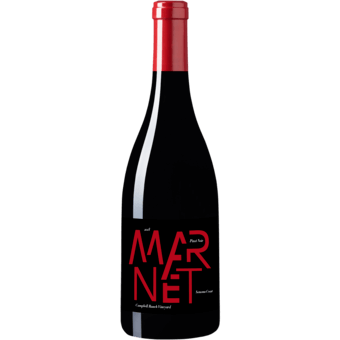
In the heyday of my 2006-2011 Wine Library TV episodes, Pinot was exploding. Burgundy was exploding as well. And I was talking about Barolo being the next thing to explode. Well, sure enough, you know like a good Monday morning quarterback, here we are nine or ten years later.
You could buy it for $40 or $60 bucks back then. Now, they’re $300 to $400 a bottle. Therefore, I thought it’d be fun to have some super culty, California wine for the holidays. Buy it for your boss, buy it for yourself, buy it for Christmas and all the other holiday dinners.
Smell Test: Okay, what a beautiful nose. It has a little bacon fat, huge strawberries… just gorgeous feet, strawberry fields forever.
Taste Test: Wow.
Wow.
Since my last wine review, I’ve had the luxury of traveling the world quite a bit and staying in some really, really, fancy hotels. This wine’s silkiness is like the nicest silkiness sheets from the most expensive Ritz-Carlton you can imagine. Just silk all the way through. Beautiful red fruit, raspberry, and strawberries throughout.
Final Verdict: 94/100. This is an incredible $50 Pinot Noir, that in my opinion, rivals $100 red burgundies that I have 15 times a year. To me, this is a 94 point Pinot Noir and anywhere you can get it under $50 is a humongous buy.
Pairs Well With: beef, game, poultry
Joseph Phelps Insignia 2014
The big dog, Joseph Phelps Insignia 2014. An iconic wine. 97 points from James Suckling and 97 points from Wine Advocate. It’s 87% Cabernet, 9% Petit Verdot, 2% Cabernet Franc, 2%. Malbeck, and costs $200 a bottle.
Over the last 25 years, that has built itself up to being one of the most significant wines in California. And I’m always so honored and excited to taste it. Let’s give it a sniffy sniff.

Smell Test: This comes across almost like a perfume, or a jam. It’s like if you walked into your grandmother’s kitchen when she made hand-made jam (now I had a Soviet grandmother and she did this all the time).
She was my dad’s mom, may she rest in peace; she was also an OG. My grandma would go outside and pick raspberries, get all cut up and crap, then come back to the kitchen and make that jam. I remember a very authentic, clean flavor. This is like that.
But when I sniff again…it smells like artificial candy. So this is a really interesting juxtaposition. On one side of the bouquet, I smelled that authentic berry, but on the other side I sniff and get a lot of candy. It’s like dessert.
Taste Test: Blackberry, black currant, dark chocolate, high cocoa count. These are real chocolate flavors. Not Kit-Kat chocolate, health food chocolate.
This is the cacao that is probably good for you, and you should probably like it, but it’s bitter and mixed in with a lot of strawberries, blueberries, blackberries, and cherries.
Final Verdict: 90/100. This wine should really still be $50 to $70, not $200 a bottle. To me, this is far from the 96 and 97 and it’s playing off its pedigree. However, it is good, and if you’re a fan of the brand it’s a solid choice.
Pairs Well With: beef, lamb, game, poultry
Conclusion
And those are my top 3 wines for the holiday season. Before I leave you, remember to try new things. Trust your own palate. You may disagree with all three of my reviews here. So try new things, try new things, try new things. That is how you become great at wine because you’ll get happiness through it. If you want a more in depth overview of each wine, check out the video I posted on Instagram (linked below).
I wish you all so much health during this holiday season.
View this post on InstagramA post shared by Gary Vay-Ner-Chuk (@garyvee)
The post The Top 3 Wines For The Holiday Season appeared first on GaryVaynerchuk.com.
December 8, 2020
Life After High School: The College Intern
Are you in high school wondering what your next move should be after graduation? Maybe you’re currently applying for university or trying to snag your dream internship? Perhaps you’ve been out of school for a little while but now you’re trying to decide whether to go back? If any of that sounds like you, keep reading.
Today we’re talking to Frederick, a 19 year old Texas native and college student who’s juggling internships, freelance writing, as well as a full course load. You may recognize him from Tea With GaryVee!
The College Intern
How would you describe your relationship with formal education?
To be completely honest, I’m not a big fan of school. I understand it, and I’ve really benefited a lot from it, but just the whole education process in general doesn’t make any sense.
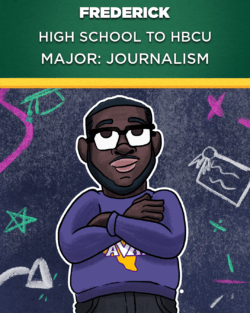
The fact that they expect everybody to go in a certain way…and maybe you go that way. You go to college but there’s no accommodations for you, specifically if you’re Black. I enjoy learning, but I don’t like school, if that makes sense.
What are some of your lifetime goals?
I like making music. I want to be a well-versed artist. And an educator, as funny as that sounds. I also want to maintain contacts so I can freelance as a journalist. I plan on getting my master’s degree after I graduate. That’s it for right now–I don’t even know what city I want to live in yet, because that all depends.
Do you think a degree will help you achieve your goals?
Well, to be honest, I didn’t know anything about journalism before I got into college. I was actually supposed to be a music major. I love music, and I still do. But, I took a music class and I was, like, “This isn’t, it.” So I literally dropped it. I already came to college with credits, so that wasn’t a problem. I just said, “You know, mom, dad, I’m gonna do this. Please trust me. Like, I know this’ll work out.” I know my degree will help me because it’s teaching me everything that I should’ve learned had I had an inclination to journalism in high school.
Since I’m already a people person, I’m able to build on these things with what I already knew. Once I started journalism, I picked up internships and I was only one class in. They were like a crash course.
So, what would you say you’re paying for with your degree? Connections outside of the classroom or the knowledge inside it?
Um, not necessarily–Covid happened. Marching Storm (the school band) already made it hard to network, because the schedule is crazy. However, I had actually just joined my first organization on campus, NABJ, National Association of Black Journalists. So that made socializing easier, but still not the typical experience.
So, has Covid changed your opinion about a college education?
Before COVID, I was all for the, you know, college experience. I wanted to do all those things. Coming into an HBCU, who doesn’t want to get into the experience?
Once COVID hit, you know, a lot of us, thought it was gonna be short, maybe a little blip in the road. But as COVID started to prove its longevity, I, kind of, bought out of the whole college experience and bought into the more, okay, it’s time to work. Virtual events only get you so far.
The thing I enjoy (marching band), might not be back next season. But, the thing I came here for, college, is still very relevant. So, I kind of cracked down on classes and I’ve been working my butt off ever since.
How are you paying for school?
Mostly through scholarships and grants. I had to take out a couple loans but, so God be the glory, my loans are not that high. Prairie View actually just got 10 million dollars to help out with juniors and seniors.
Did people from your community, household, support system, expect you to get a college degree?
Well, I’m not first generation at all. I think my grandmothers, and my dad, they have their masters in education. My mom has her masters of education; she’s a counselor, my dad’s a principal. My sister is a teacher too, she graduated from Baylor University. I have a whole family of educators. So my background was solid.
They taught us from a young age, “You want to make it, you need to go to school. We’re not gonna allow you to not get your education. That or the military.” And, you know, education was always emphasised more than the military.
If the traditional college system did not exist, and there were no formal means of networking and talking to professors, how would you achieve your goals?
I really don’t know but I think I’d figure it out on my own. Networking in college hasn’t really helped me as much as networking in the real world. You put your resume together, talk to people, and it’s like “there you go”.
I feel like I’d work a way around it, but, I would probably be a lot more lost than I am now. You know, I’m appreciative of the system because, I mean, it helps.
What would you like to tell people that are considering being a journalist, or that are considering teaching?
You need to work for it and you need to earn your stripes. I was actually in a Clubhouse room yesterday, we were talking about this. Right now, I’m doing six month internships. When I started, I wasn’t expecting to be paid, because I know how broad the field is, I know how many people there are. So, it’s one of those things where if you want to do this, you need to understand that you’re not gonna get the respect you deserve, you’re not gonna get the recognition that you like, and, you know, x, y, z might not happen to you.
But you need to push through. If you want to make your name great, that’s what you’re gonna have to do, you’re gonna have to work through all those things.
Some people debate whether college is worth it. What do you think of the overall system?
As far as education, I just want to say: get to know people. Learn people, learn how people are, because you’re gonna meet so many different types of people in the education field.
You need to be well versed to be a teacher, support people, and help them succeed. You don’t necessarily need to be so legalistic about it, to the point where you don’t know how to approach a person, but I feel like that’s what our education system has cultivated. That’s why I see a lot of educators are trying to dismantle that and I appreciate it.
Growing up, my dad made a difference in people’s lives. He would buy kids lunch if they needed it, he would show up at funerals…that’s the kind of difference I want to make in my students’ lives.

Resources:
Resources for potential HBCU students
The post Life After High School: The College Intern appeared first on GaryVaynerchuk.com.
Life After High School: The Workforce
Are you in high school wondering what your next move should be after graduation? Maybe you’re currently applying for university or trying to snag your dream internship? Perhaps you’ve been out of school for a little while but now you’re trying to decide whether to go back? If any of that sounds like you, keep reading.
Today we’re talking to Sydney, a North Dakota native and proud member of Gen Z navigating Covid, the education system, and joining the workforce. Keep reading to get Gary’s take on her journey and his advice for anyone in a similar position.
The Workforce
Syndey Puppo is a little bit of everything. She’s a part time makeup artist, part time skincare specialist, full time charmer. The 21 year old, Fargo native broke down how certain policies have impacted her education and what makes her generation different from the rest.
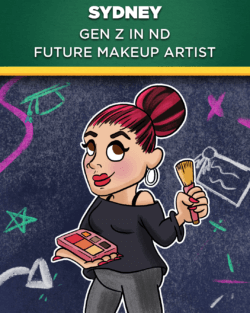
What was your relationship to formal education?
“It was shitty. It was bullshit. They say no child left behind and all that really means is, ‘you didn’t learn anything but we’re still gonna let you pass’. That’s the vibe.”
“I didn’t learn anything. That may be a personal issue, because I was never there but, I always had a really good relationship with my teachers anyway. Still, I feel our relationship or my presence in class, was more for entertainment purposes. I don’t know if they expected me to go to college. I made friends with other kids just to get my homework done.”
When I graduated, everyone told me I had to go to school, get a degree–but I didn’t like school. I went to shut everyone up. They kicked me out of my cosmetology course two weeks before I graduated.
What are your plans, post-Covid?
“In September I’ll get my health and nutrition certification from [Cornell].” I plan to help people with their health and lifestyle. I don’t really care about the name of the school or the certification–but I know other people do.
“It always looks good to have a certificate or something that says, I know this thing.”
However, I don’t think it’s necessary. I worked in the makeup industry without having a cosmetology certificate. I learned makeup artistry because both of my parents are makeup artists.
I’m going into wellness because makeup and health goes hand in hand. If you want to be pretty on the outside, you have to be pretty on the inside, you know? I like it and I know a lot about it. A lot of people study something they know nothing about and they hate it.
Why do you think people pay for school, post high school?
If something is expensive you want it more–[school administrations] want you to believe you need it, but you’re paying for bragging rights. School is bragging rights and validation from your loved ones. I know we need education, but there are a lot of people with degrees they don’t use. Unless you know for sure you want to study what you’re paying for, it’s a waste of time. You can learn for free by using the internet.
How did you pay for your first time around in cosmetology school?
My counselor filled out my loan. I had no idea what was happening. I had my mom co-sign, a terrible idea. Thank god they froze the student loan repayments.
Has Covid changed the way you think about school?
The one good thing about Covid is that it gives everyone the chance to learn a new skill. People can study something for a little bit before committing a lot of time and money.
How is Gen Z different from previous generations?
“Me, personally, and a lot of people in my generation, know we have to have multiple sources of income. Our parents or our grandparents, they would have one career and stick with it, it’s different for us.
Our generation is hyper vigilant because we’re the generation of flexing. We make a lot of money but we show it on instagram, it’s a constant pull. We’re always aware of who’s making money and comparing ourselves. A lot of people are becoming more open to sex work because we refuse to struggle. We just keep going because we’re hustlers.
People say we’re lazy and entitled. We are, but we also fight for what we want. We’re greedy, kinda. It’ll keep us alive during the pandemic.

Gary’s Take:
I know it’s hard during the pandemic, especially if you’re in an industry that doesn’t allow you to work from home. If you find yourself in that situation and you don’t want to give up on the industry of your dreams, don’t give up. Use LinkedIn or Instagram or whatever platform you’re most comfortable with–and network. Comment thoughtfully, add value to someone’s comment section and someone will notice. That’s just how it is.
“I think social commentating is an incredible way to build momentum toward opportunity. What I mean by that is, if you want to be a makeup artist and you have skills, and you leave 45 meaningful comments on 45 Youtube videos, Instagram or TikTok accounts ( and I mean meaningful, not like “pretty” or “rad”) I think that is a great miss.
If you are not a great content creator, but you want to be known for your craft, the number one thing I don’t talk about is (nor does anybody else) is the commentating content creator. Which is, instead of spending 3 hours to create that piece of content, spend 3 hours going into 50 pieces of creative art around that subject matter and being an incredible contributor to that community.
We’re having a moment here and everybody is starting to realize it. If you love basketball and you go to all 70 top basketball Youtube, Facebook, and Tiktok accounts and you spend 3 hours a day leaving fire (3 or 4 sentences of real thoughtful content) well, aren’t you a great writer. Aren’t you doing the same thing that people at the Washington Post, CNN, and the New York Times do? I think it’s a monster idea that people should seriously consider, and I don’t see a lot of people doing it.
Don’t spam an account to show up first. Leave meaningful thoughts, times 50. Be active digitually, then show up–virtually or physically.
Resources:
24 Free Online Ivy League Courses You Can Sign Up for Today
How Much Can Influencers Actually Make?
9 Tips for Young Women Entering the Workforce
The post Life After High School: The Workforce appeared first on GaryVaynerchuk.com.
Life After High School: The Traditional Student
Are you in high school wondering what your next move should be after graduation? Maybe you’re currently applying for university or trying to snag your dream internship? Perhaps you’ve been out of school for a little while but now you’re trying to decide whether to go back? If any of that sounds like you, keep reading.
Today we’re talking to Megan, a long island native who’s currently attending Columbia after getting in on her first try, soon after she graduated from high school. Keep reading to get Gary’s take on her journey and his advice for anyone in a similar position.
Traditional College
Megan is another proud member of Gen Z. She’s a junior at Columbia University, also experiencing the effects Covid has on her education.
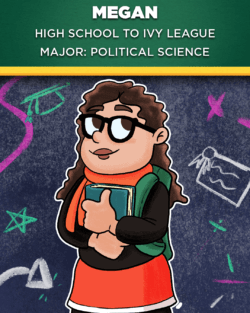
Relationship to formal education.
Education has always been a strong part of my life. I’ve always been a good student. It was one of my defining traits. Also, it was very common where I grew up.
Do you think your degree, and the education you’re getting, will help you more effectively serve people? Or will it just help you get better opportunities?
I think the type of people I’m meeting here are informing my political thinking. There are lots of wealthy people but Columbia also has a generous aid package, so there’s a good mix of ideas.
I’ve never learned anywhere else so I don’t know if the education from Columbia is better equipping me to be an advocate for certain people, but I do know it’s changing my thinking and challenging me. I have a deep understanding of the first amendment and state politics–I’ve had great professors and I’m learning so much.
But I know prestige begets prestige which will help me in the future.
What are some of your goals?
I became interested in law after taking some electives in high school. Later, I got into local politics after doing a few political campaigns, both in DC and here in New York City. I want to go to law school, that’s my formal education, end goal. I’d like to be an attorney, judge, or run for local office.
Will college help with your goals?
I was really conscious of this when I was applying. I want to go to a law school that’s prestigious and rigorous, so I need to attend a similar undergraduate university. The top law schools definitely consider your undergraduate degree. I want to get a foot in the door with more competitive graduate schools. For some people, price is more important than prestige. My twin brother, for example, he wants to be a nurse so he’s more interested in what’s the most cost effective.
What is your tuition paying for?
Networking, education, and the professors. I’ve studied under amazing professors; Columbia opens doors. When I have Columbia on my resume it gets me the interview. There are Columbia graduates who only hire Columbia graduates.
How are you paying for tuition?
Lots of financial aid, and I’m an RA. I might not be an RA if that didn’t make it virtually free for me to come here. My first semester I did take out some student loans and my mom had saved money as well.
People assume schools like Columbia or Havard are unaffordable, but they have massive , billion dollar endowments. They just throw money at students that need it. Everyone should apply and take advantage of the financial aid packages.
Of course, it’s not as accessible if you’re an international student. It’s definitely difficult to get in but once you do, the administration works with your financial needs.
Has Covid Changed Your Opinion Of School?
Covid has taken away the social aspect of school. But I’m able to do the same readings, discussions, and work virtually. It’s easier in person but Covid hasn’t changed my opinions.
Do you think you can learn the same things you’re learning at Columbia just by joining the workforce?
“There’s theory behind something, then there’s practice and putting them together creates praxis.” School helps me ask, “why do we do things this way? Can we do things differently?” School gives you the basic knowledge of how systems work and also the tools to think critically about it. School doesn’t necessarily prepare you for the workforce, it gives you the scaffolding to or foundation to change the workforce or see if the processes are working the way they’re intended. It expands you, not prepares you.
Study what makes you passionate, not what’s practical. You’ll be much happier.
Did your community push you to go to school?
Yes. We had guidance counselors, mandatory meetings, even if you weren’t applying to college you had to meet with a guidance counselor to explain why that was the case. Vocational school was fine but you had to be doing something. Everyone was expected to complete another level of school. No one mentioned gap years.
Why?
I think it’s a hand me down fear. I’ve never met someone who is young that didn’t want to go back to school after taking a gap year. Even my parents don’t want me to take a gap between undergrad and law school. I feel like people go back if they want to go back.
[image error]
Gary’s Take
Hiring empathic professionals is easy. A university’s leadership just has to look for them. It has to be part of the process. We spend a lot of time at Vaynermedia looking for “nice people” because that’s important. I think we also need to be empathic to universities–they are businesses, period, end of story.
They’re going to lose their professors to other colleges if they can’t pay them. These colleges, universities, private schools, have shown their cards during this pandemic. They are 100% financially dictated; they’re full of shit of trying to pretend they’re not. I don’t like that part…by the way, on the record, I understand.
A lot of times we look at businesses as “evil”. I don’t look at it that way, I look at it as they’re doing what they need to be doing. Then you, as the individual, need to do what you need to do.
So much of college is ROI: the campus, the people you meet, the experiences–and when they want the same amount of money for you to sit a home on Zoom, you can say go fuck yourself and I’m out.
I’m not surprised that kids are concerned with the administration now because young millennials and Gen Z are some of the most aware, conscious subset of people. However, that bleeds into delusions and ideology . Like, you might not pick a university because you don’t like how they handle things, but remember, they’re doing this to stay alive financially.
People complain about other people making business decisions, and I’m like Why are many people getting a diploma? To leverage it for yourself. Don’t be a hypocrite. It comes down to an honest conversation.
The colleges are doing what’s right for themselves, let’s not act like they’re not.
Resources
How To Get Into An Ivy League School
Part Time Jobs For College Students
Learn About Campus Life At Columbia
The post Life After High School: The Traditional Student appeared first on GaryVaynerchuk.com.
Life After High School: The Apprentice
Are you in high school wondering what your next move should be after graduation? Maybe you’re currently applying for university or trying to snag your dream internship? Perhaps you’ve been out of school for a little while but now you’re trying to decide whether to go back? If any of that sounds like you, keep reading.
Today we’re talking about Frank, a millennial who discovered his passion at age 15. Now, he’s giving his take on “the hustle” and what it takes to succeed. Keep reading to learn Gary’s take on Frank’s story and his advice for future hustlers with a dream.
Apprenticeship
Frank is a millennial who just turned 31 this year. Rather than attend a formal university or trade school, Frank networked his way into an apprenticeship at just fifteen years old. He’s spent the last fifteen years cutting hair, perfecting his craft, and growing his client base. Then covid happened.
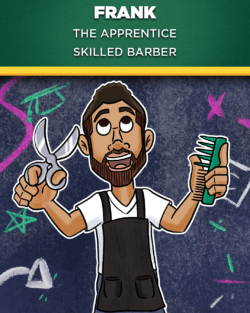
How has covid affected the cosmetology industry?
“Everyone’s trying to make do. It’s just you [don’t] have new clientele walking in anymore. You don’t have random people just walking in and waiting for a haircut. So it’s difficult to build a business. People aren’t able to look at every barber to see what kind of styles they have and what they would like in a haircut.
It’s a mess right now.”
How did your relationship to school impact your decision to become a barber?
“I would focus but dealing with your peers…dealing with ‘oh, let’s do this after school’, it interferes with your studying. I think once you get older, and progress through your high school career, you’re less focused on studying and more on having fun. I knew what I wanted to do though; I started cutting hair when I was 15 years old.
It started off as a little hobby, then I thought wow, maybe I could do this as a career. I had been getting my haircut at lots of different barber shops, so, you know, you talk to your barber. You ask, how much [a barber] can make and things of that nature. I found out I can make a lot of money cutting hair. That was my thought process, if I build my clientele I can make more money than someone who attends college.
Although you mostly learn on the job, I made the choice after high school to go to cosmetology school. It teaches you how to pass the licensing exam.”
Did your high school have cosmetology courses?
“They did but you had to be a “model student”. A teacher had to recommend you and your parents had to agree to it. I couldn’t find a teacher to recommend me, so I didn’t get that opportunity. However, there was another program close by so I went there, during electives, instead.”
How did you build your client base? Social media?
Word of mouth is better than a social media following. You have to network and be social. Social media is good to showcase your skills, not build a clientele–unless you’re in an area that’s underserved (i.e. “little to no word of mouth”), then you can build on social media. Still, you have to make sure your craft is excellent.
Although, social media may be a good place to start. In the beginning, you could be very aggressive with it. Instagram helps you get clients, then they should give you the word of mouth [clients]. It’s like building an Ebay account. You can’t have a social media following without any reason to follow you. I know someone, I won’t say who, who only had a few clients. Then she recycled each photo until her client list began to grow.
It takes years to build a good, tangible client base. Your location matters too. There’s a lot to think about when it comes to a profitable business. It’s definitely not just social media.
Do you think you’ll continue your career post-Covid?
I love cutting hair, don’t get me wrong, but I’ve been in the business for 15 years, it takes a toll on your body. Maybe I’ll switch industries. I could be a business owner, and have my own shop. It’s an easy business to run in my opinion–but it’s just a headache. I think if I did want to open a business I wouldn’t need a college degree. I would just need to know the right people.
What do people pay for when they pay for school?
Just like any product or service, you’re paying for the name. It’s the same thing as anything else. Just because it says Louis Vuittion, it’s more prestigious. In the end, all that matters is if you work hard. If you work hard you’re gonna get it, that’s how you succeed.
“I’m not going to take education completely out of the equation, because education is important. But, getting a master’s or a doctorate degree…” [there isn’t always a strong financial return on your investment]. Especially when you factor in student loans. Sometimes “uneducated people” , those who only know a trade, can make more money than those with multiple degrees.
Plus, Covid. Everyone learns differently and no one wants to sit at home on a computer.
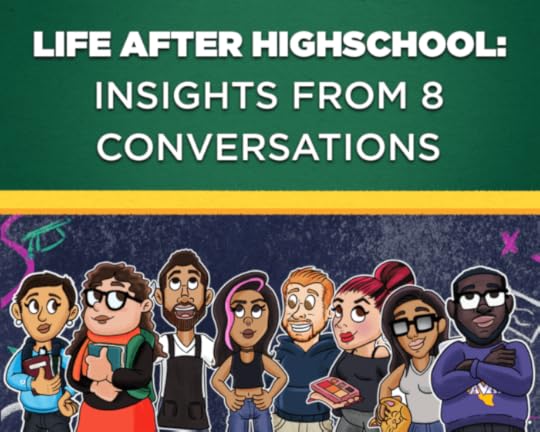
Gary, how can people do what Frank did if they live far away from their dream industry?
Get a boring job for a year, save every dollar, then travel to where you need to and live rough until you don’t have to anymore.
People throw around the word “dream” too easily. Like, they’re talking about getting an ice cream cone down the street. My dream is this, but you’re not willing to sleep on the couch and eat Mcdonalds for a year? You’re telling me it’s your dream and you’re not willing to get a job you don’t like, maybe bartending in the worst bar in town, to save up money to buy a ticket to LA?
I’m not assuming anybody has any money but if you have a dream, work for it. Save up to afford a plane ticket and the first week in a hotel. DM every person who lives in LA to find one person who will let you sleep on their couch for six months. Or a friend of a friend–dreams require doing everything.
Don’t tell me you want to be a movie star while being unwilling to pay the sacrifices to get there. What do I recommend? Lock into your mind that the next five years of your life are gonna be garbage. You’re not gonna have luxurites. You’re gonna live real raw, but good new, you’re gonna be chasing your dreams. That’s the best.
Resources:
How To Land Your Dream Job With No Experience
What Are Apprenticeship Programs And How Do They Work?
How To Become A Successful Barber (A Guide)
The post Life After High School: The Apprentice appeared first on GaryVaynerchuk.com.



